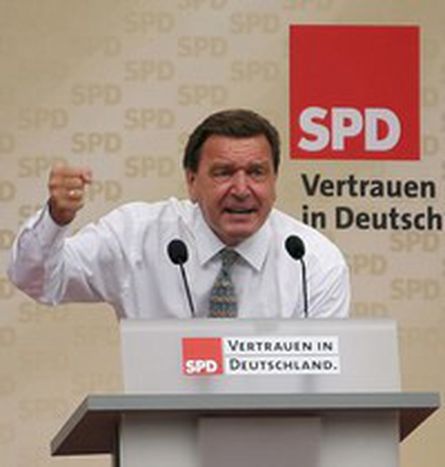
The long road to early elections
Published on
Translation by:
 akasemi newsome and fiona woll
akasemi newsome and fiona woll
Why has Germany choosen to hold the general election a year early? And how does the complicated process which has enabled new elections actually work?
2006 should have been Germany’s year: playing host to the World Cup and a general election were on the cards. However, the elections to the federal parliament, the Bundestag, will now take place in a matter of days, on September 18.
“For the, in my opinion necessary, continuation of the reforms [aimed at reviving the economy] I consider clear support from the majority of Germans a necessity. As chancellor of the Federal Republic of Germany, I believe it is my duty and responsibility to do everything in my power to make sure that the President [Horst Koehler] uses the constitutional means available. . . to call elections to the Bundestag as soon as possible,” announced Gerhard Schroeder, the German chancellor, to the Parliament and electorate last May. With the current Parliament only in the 3rd year of this session, the news of elections stunned everybody.
A string of setbacks
So what had happened? Just two hours before this speech, Schroeder’s Social Democrat Party (SPD) had had to relinquish control over its stronghold, the federal state of North Rhine Westfalen, to the Christian Democrats (CDU). Already on March 17, another traditionally SPD region, Schleswig Holstein, had succumbed to the CDU. And these were but the icing on the cake of a long succession of electoral defeats. Analysts attribute SPD losses to widespread resentment at the cuts in social benefits made by the current government. Despite this, Schroeder is certain to go down in history as the Chancellor that began to reform the welfare state. Experts consider Schroeder’s reform programme ‘Agenda 2010’ too half-hearted and claim that it does not go far enough, whilst the overwhelming majority of the public consider it to be the death-knell of the welfare state. If, despite his low opinion-poll ratings, Schroeder manages to retain power, he could well choose to continue along the reform-path he has begun to tread. He may well choose to do this despite the second house, which represents the interests of the federal states and has to approve almost all legislation, being dominated by the opposition CDU-party – a constellation which has made governing notably difficult for the SDP-Green coalition government.
A false question of trust
Since the German Constitution does not allow parliament to dissolve itself, the path to early elections is not easy. This clause exists because of Germany’s unfortunate experience during the Weimar Republic, in which parliamentary governments were particularly unstable and rarely remained in power for a full term. Only the federal president can dissolve the Bundestag and call for new elections, for example when there is a vote of no confidence in the Chancellor, or if the Chancellor does not command the majority needed to govern – the very situation faced by Schroeder.
On July 1, Schroeder tested satisfaction with his government by instigating a ‘false’ vote of no confidence – and, as planned, lost. A sufficient number of the SPD-Green coalition abstained from voting. Federal President Horst Koehler became the man of the hour, with 21 days to approve the vote of no confidence and set the date for new elections.
In a live broadcast on national television on July 21, Koehler announced the dissolution of the 15th federal parliament and stated that new elections would take place on the September 18. The reasons he gave for his decision echoed those given by Schroeder: “Our country is faced with some Herculean tasks. Our future, and that of our children, hangs in the balance. Millions are unemployed, and many have been for years. The State’s finances, from the federal down to the local level, are in a previously never experienced critical condition. The current division of responsibilities in the federal system is overwhelmed. We have too few children and we are getting increasingly older. And we must be able to compete under conditions of fiercer, international competition.” Both the Chancellor and President see the solution to these problems in a parliamentary majority. Germany’s highest court, the Federal Constitutional Court also toed the Chancellor’s line when it decided on August 25 to support the dissolution of the Bundestag and the call for new elections, thus deciding in favour of Schroeder in the case brought by the two parliament members Werner Schulz (Greens) and Jelena Hoffmann (SPD).
Schroeder has failed to mention how he will deal with the reversed majorities between the two houses, should he remain in power. But it may not be necessary — current polls predict a majority for a Liberal-Christian Democrats coalition government. This would leave Schroeder no option but to take a back seat as Angela Merkel takes his place.
Translated from Der lange Weg zu Neuwahlen


